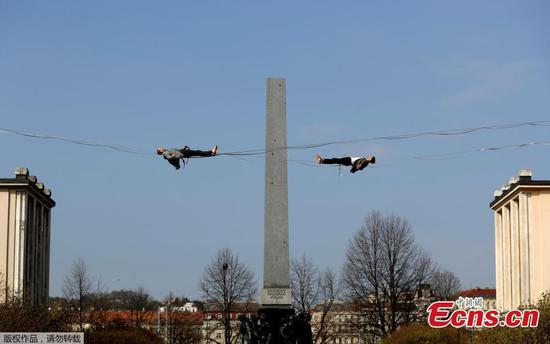European Commission President Jean-Claude Juncker appeared to close the door on Wednesday before British Prime Minister Theresa May's request for a second short extension of Brexit, saying it would not be possible if the withdrawal agreement was not approved by the British House of Commons by April 12.
Shortly after May's appeal, Juncker gave the strongest evidence to date among growing indications that the European Union (EU) was bracing itself for a no-deal Brexit against the deadlock in British politics, despite how costly it would prove to both the bloc and Britain.
NO-DEAL BREXIT "VERY LIKELY"
"I believe that a 'no deal' at midnight on the 12 April is now a very likely scenario," said Juncker as he addressed Members of European Parliament (MEPs) meeting in Brussels for a part plenary session on Wednesday.
"It is not the outcome I want. But it is an outcome for which I have made sure the European Union is ready," Juncker added.
Nearing the end of his term before the European elections in May, Juncker said that if Britain will be in a position to approve the Withdrawal Agreement with a sustainable majority by April 12, the EU should be prepared to accept an extension until May 22.
April 12 would be the "ultimate deadline," however, for the House of Commons to approve the withdrawal agreement, he said.
Absent that approval, "no further short extension will be possible," said Juncker, for whom to extend any further would risk compromising the bloc's elections, and destabilizing the EU.
Speaking Tuesday in Brussels, EU chief Brexit negotiator Michel Barnier also said a no-deal Brexit was likely. "I do not wish for no-deal, I did not work at any moment for a no-deal, even if we are prepared," he said.
During a Tuesday press conference on the occasion of an official visit to Paris by Irish Prime Minister Leo Varadkar, French President Emmanuel Macron placed the responsibility for the no-deal scenario with British leaders, asking for the British government to say what it proposed, and "to say it now."
"If the United Kingdom is not capable, nearly three years after the referendum, to propose a solution the brings together a majority, it will itself have chosen, de facto, to leave without an agreement, and we can not avoid failure for them," the French president said and repeated in a tweet.
For his part, Varadkar also indicated that the EU needed to avoid a "rolling extension," and that any proposal for more time "must have a clear purpose and a clear plan."
Both leaders pledged solidarity, and insisted that the "good functioning" of the EU and the single market needed to be a priority.
LOSSES EXPECTED IN EU AND BRITAIN
Governments and independent analysts appear to agree that a no-deal Brexit, in which the two parties revert to World Trade Organization rules, would be the costliest scenario with repercussions for both Britain and the EU.
According to estimates by the International Monetary Fund, the real output for the remaining 27 EU members would decline by 1.5 percent in the long-run relative to a no-Brexit scenario.
In such a case, the Republic of Ireland would be hit hardest with an output loss of 4 percent, followed by the Netherlands, Denmark and Belgium.
A report by the Dublin-based Economic &Social Research Institute published on March 26 also said Ireland would be the worst-affected in the EU. In the most undesirable scenario of a disorderly no-deal Brexit, the level of real output in the Irish economy would be 5 percent lower, compared to Britain staying in the EU.
While the EU members appear sure to suffer losses, Britain is widely predicted to be biggest loser.
In terms of trade, total EU exports would be reduced by just over 2.1 percent in the case of a no-deal Brexit, but total British exports would fall by just over 9.8 percent, according to economists Martina Lawless and Edgar Morgenroth.
In a late March report, German think tank Bertelsmann Stiftung estimated EU citizens would bear the brunt of 40 billion euros per year in income losses in the case of a no-deal Brexit, but that British citizens would suffer income losses of 57 billion euros per year, or approximately 900 euros per capita per year.
Meanwhile, European businesses and trade associations are preparing for the worst. A report on "Risks and Vulnerabilities in the EU financial system," published Tuesday by the Joint Committee of the European Supervisory Authorities urged EU banking, insurance, pensions and securities sectors to make strong contingency plans for possibilities of strong market volatility following a no-deal Brexit. (1 euro = 1.12 U.S. dollars)


















































